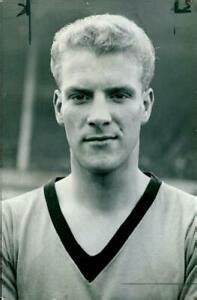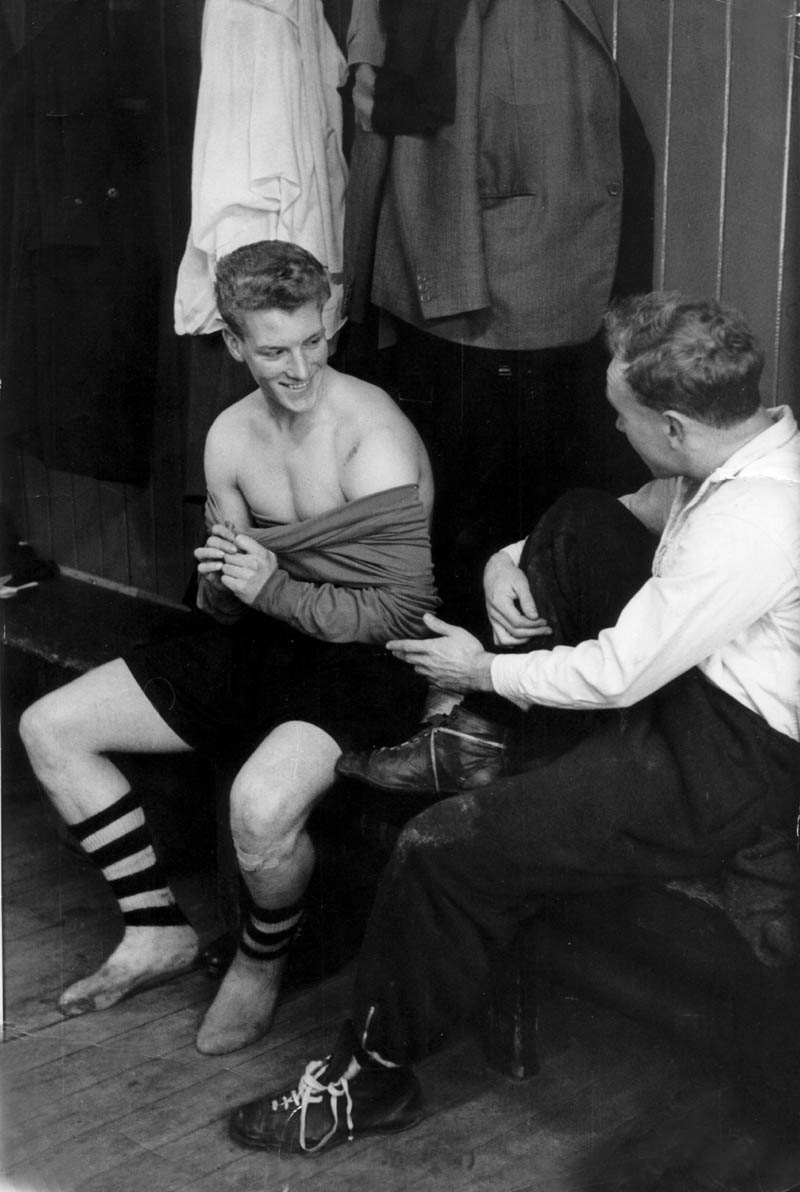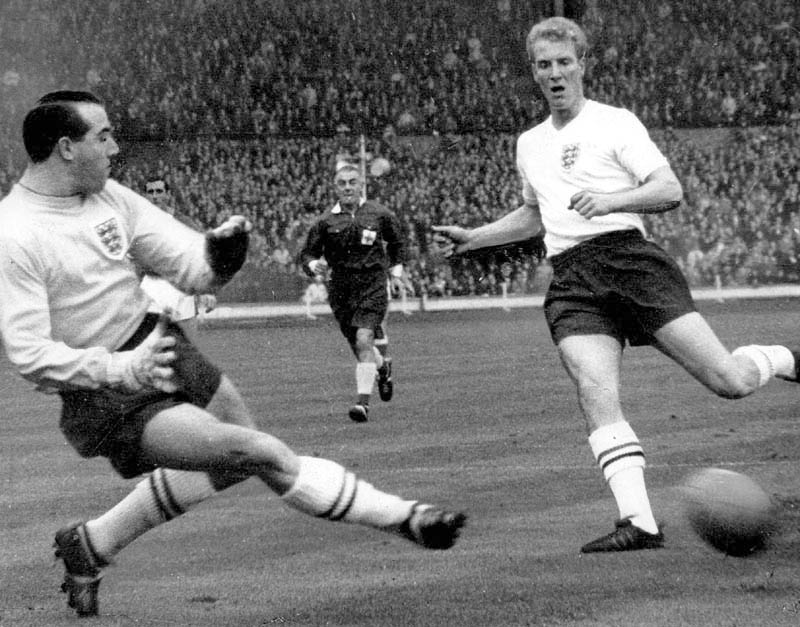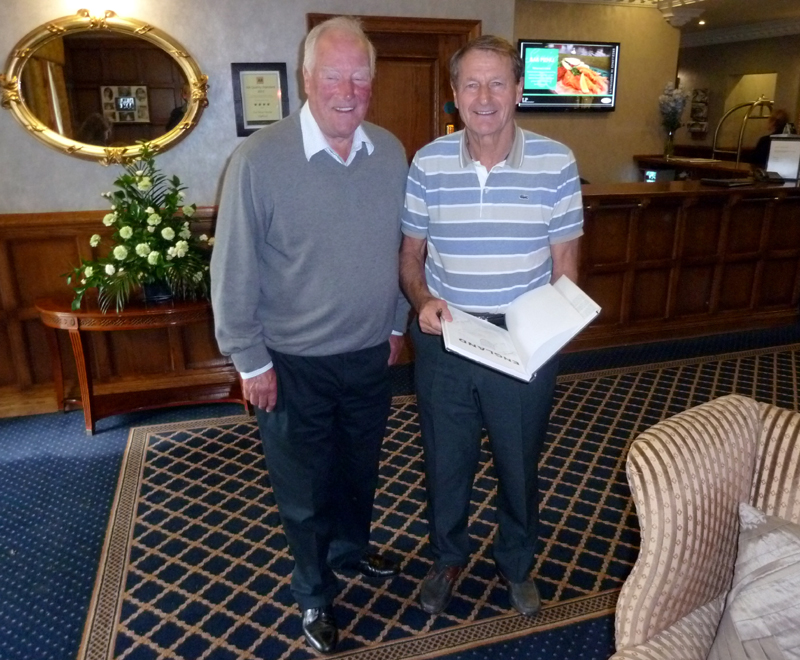True Great And A Serial Winner
By David Instone
It wasn’t compulsory for Wolves to have a half-back of a certain striking hair colour in the 1950s and 1960s. But it might have seemed that way.
Billy Wright occupied the no 5 and no 6 shirts for almost two decades, Graham Hawkins did so for a much briefer spell years after and, linking the two, another blond bombshell, Ron Flowers, emerged as a true colossus of Molineux’s glory years.
Where do we start with this 1966 World Cup squad member? What was he so good at? Well, he could shoot, head, run and tackle, according to those fortunate enough to have seen him play on a regular basis, so ‘What couldn’t he do?’ would be a more relevant question.
He turned on all this power for a long time, too, signing at Molineux in 1951, making the first of his 512 League and cup appearances in the autumn of 1952 and not bidding farewell to the club until 1967. Golf was very much his ‘other’ love but maybe we can be permitted mixing up our sporting terms here and referring to his stay as a terrific innings.
It may not have come to such glorious fruition, though, if Doncaster had been quicker to spot his teenage potential. Thankfully, his local League club were slow on the uptake and Wolves – Mark Crook and Wath Wanderers in particular – took full advantage.
Rovers had first dibs after he had graduated with honours through a schools system in which he was a team-mate of Alan Finney – later a captain at Sheffield Wednesday.
Young Ron had the chance of a trial at Hillsborough as well but it was perhaps written in the stars that he would turn up at Belle Vue. His Uncle George had played there and such were the genes that younger brother John, who later married professional darts player Maureen Flowers, had a substantial career with Rovers as well as at Stoke and Port Vale.
Their dad, a miner, was a good amateur player and would give Ron shilling if his side beat good opponents – and another shilling if he scored. But advances were hardly swift despite the financial inducements.
Doncaster were forward-thinking enough to find Ron a job in the nearby loco-sheds but less dynamic in giving him match-day opportunities. It must have been utterly galling to them over the decades to think they allowed him to drift away to a workingmen’s club team without him reaching their first team.
Mark Crook, the former Wolves right-winger who was by now running a fish and chip shop in South Yorkshire, had no such blind spots and signed him for Wath at 16, initially using him as an inside-right.
Flowers once regaled me with the tale of how one of his early games was away to Newcastle Youths, from where he and his colleagues were whisked off to watch Wolves’ first team play down the road at Sunderland. He loved what he saw and did all he could to earn a piece of it for himself and find an escape from the grime of the ‘day job’ he was starting to dislike.
His subsequent trial in the West Midlands led to him being taken on by Stan Cullis at £7 a week (a pound less in the summer) and he was already seen as the latest in a line of the powerful wing-halves the club had had on either side of the war.
Home in these parts was initially was provided by a Mrs Long in the Chester Street area of town. Already in the same digs was Peter Broadbent, the two having bumped into each other as Ron took an exploratory walk after arriving from Yorkshire on August Bank Holiday Monday with another young hopeful, Dick Neal.
The starry-eyed 17-year-old Flowers was introduced to the senior players by Jimmy Mullen and appeared first in the fourth team in the Worcestershire Combination, then fulfilled 12th man duties soon afterwards for the reserves at Derby.
He was soon in the Central League side, only for homesickness to emerge as one of two main obstacles to his progress. While growing six inches and putting on two stone in his first 18 months at the club, he also had to confront the thought of national service and was kitted out for the RAF at Padgate, near Warrington, two weeks before his 18th birthday.
It was after he was stationed more locally at Hednesford that a sergeant appeared and demanded to know: “Which one is Flowers?” Upon identifying himself, the startled youngster was told to get to Molineux immediately as he had been named for his first-team debut there against Blackpool the following Saturday.
The task of marking Stan Mortensen was given to Billy Wright but Ron still had his hands full with Ernie Taylor and Wolves were three down in double-quick time. The debut goal he scored with a long-range header following a Johnny Hancocks corner was scant consolation in a 5-2 defeat.
He was out again for the win at Chelsea a week later but immediately restored for a 6-2 thrashing of Manchester United and wore the no 4 jersey a further 18 times that season as Cullis’s men finished third.
Fifteen Division One outings followed in 1953-54 as the League title came to Molineux for the first time, his big breakthrough coming in the valiant defence of the crown 12 months later. He was overlooked for the first three matches before playing in 37 of the other 39, most of them at left-half, as the side finished runners-up.
This was a team of stars, so international calls were plentiful, although news of Ron’s first selection for the senior England side after his under-23 recognition came in an unusual way, Broadbent excitedly waving in his face the Daily Express announcing the squad for a summer tour of France, Spain and Portugal.
Wright, Dennis Wilshaw and Bert Williams were also on the trip but it wasn’t the happiest occasion for the new boy, who performed poorly in a 1-0 defeat in Paris on the day Wolves had four players in a national side for the first time.
Flowers was forcibly reminded by Stanley Matthews that he liked the ball played to his feet, not for him to run on to, while legendary player-turned-writer Charles Buchan sought him out at a post-match banquet to say: “I have slated you in my report, son, but you are young enough to come back.”
The shirt passed to Portsmouth’s Jimmy Dickinson and, after the pride of fulfilling a family promise by handing his first England cap to his father and taking his parents on holiday to Blackpool, came the hard slog to re-establish himself
Not just at international level but also with Wolves, where he found himself partly in the shadow of the emerging Eddie Clamp as he was given only 18 League and Cup outings for a side who again finished third in the top flight.
The follow-up was much happier for him in the form of a near-ever-present contribution in 1956-57 but he once more had to be patient the season after in the second of Wolves’ three title triumphs in the decade, his 29 games underlining how powerful the club were in the half-back department with Wright, Bill Slater and the ten-goal Clamp also at Cullis’s beck and call.
Flowers had the satisfaction of scoring in each of the last two games of the glorious campaign, though, and his rising fortunes were reflected by events at international level.
Having missed out on joining the Molineux exodus to the World Cup finals in Sweden, he received his first England call-up in more than three years when selected for the game against Wales at Villa Park. And this time he stayed in.
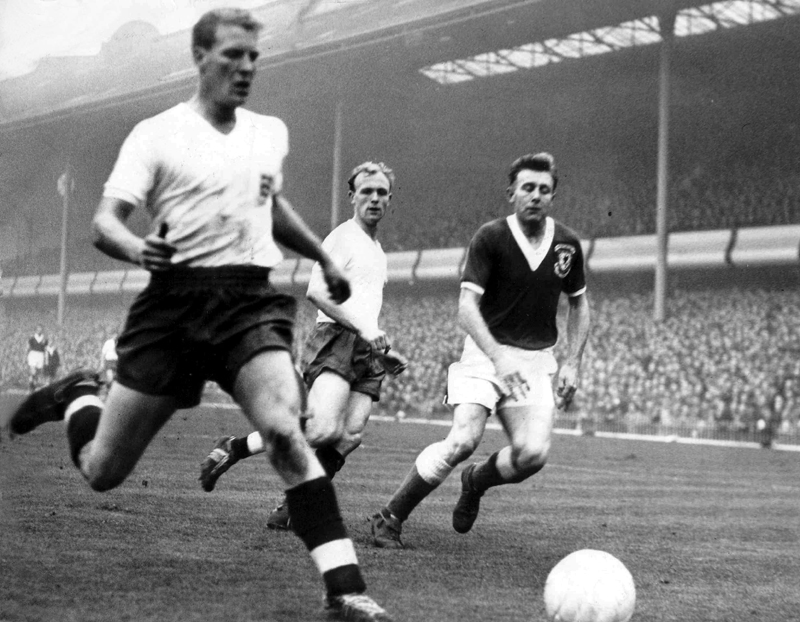
For another 40 internationals across four and a half years, to be precise – a span including Billy’s 100th cap and the epic tour of South and Central America that followed. His peak in the three lions was around the time of the 1962 World Cup finals in Chile, by which time he had helped Wolves win another League crown and an FA Cup.
His stock was sky-high. Captaincy of club and country came as well and he scored England’s first ever goal in the European Championships (then the Nations Cup). Ron even came to be regarded as the country’s penalty-taking expert – how useful would that art have come in over subsequent decades? – although Terry Wharton retained the role with Wolves.
The down-side to his career at that time was that Molineux fortunes were in decline, although he continued as one of the first names on Cullis’s team sheet.
He passed the 40-game mark for Wolves alone in four successive seasons but the emergence of a certain Bobby Moore meant his accumulation of caps declined appreciably. He just stayed around long enough to line up twice alongside a rising Charlton wing-half named Mike Bailey before Nobby Stiles’ emergence pushed him even further to the fringes – this at a time when he had landed in the Second Division for the first time.
It was by no means a certainty that Flowers would be named by Alf Ramsey for the World Cup but there he was on the list as the oldest member of the squad. And it is common knowledge that he might even have played in the final had Jack Charlton not recovered from the high temperature he reported to the team doctor on the Friday night.
In the end, Ron wasn’t needed on that triumphant afternoon against West Germany and remained marooned on 49 caps – still by far the most of any Wolves player in history but for Billy Wright. His ten goals were a useful supplement to the 37 he netted for Wolves and left him, at that point, among the top dozen or so England marksmen of all time.
Flowers, who also represented the Football League 13 times, played a full hand as Wolves missed out on promotion at the first attempt in 1965-66 but appeared only 14 times, the last of them at Bristol City on January 7, in the season the club booked their Division One return under Ronnie Allen.
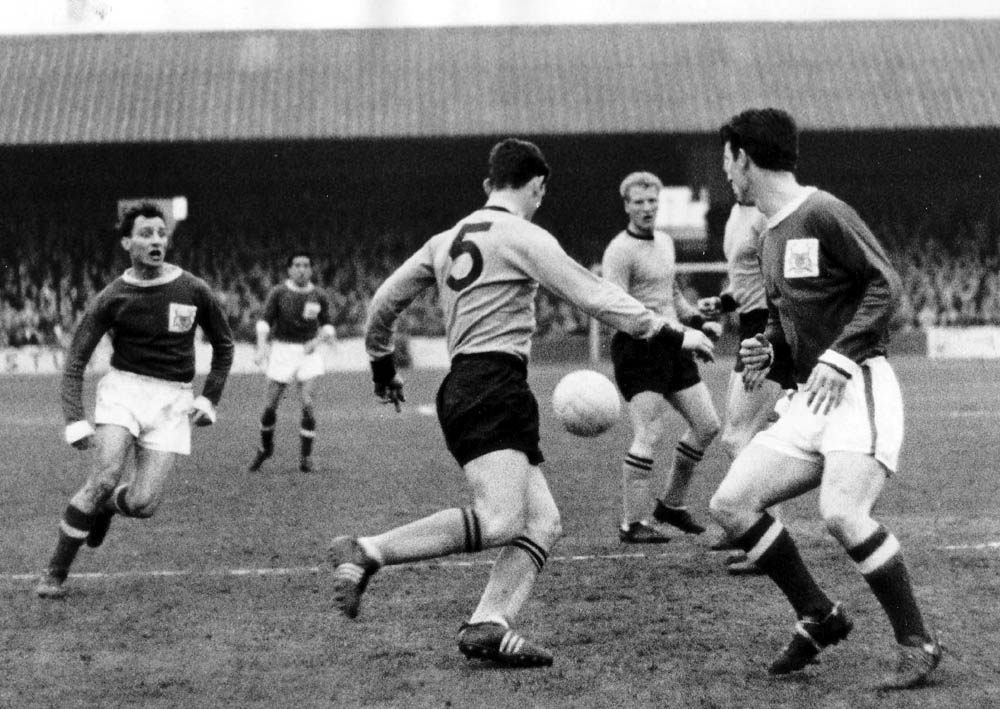
He was by now well into his 30s, playing in a deeper role, and called time on a Molineux career of 16 years by joining Northampton, where he amassed a further 60-plus games that coincided with him being elevated to the post of player-manager.
He later had the same role at Telford United (known as Wellington at the time of his arrival there) and inspired them to the winning of the FA Trophy at Wembley in 1971, his half-time address playing no little part in turning round a game that was very much going against them as they trailed Hillingdon 2-0. In the victorious team were Jimmy Murray and Joe Owen, two forwards from either end of the Molineux spectrum during Flowers’ time there.
That success suggested Ron might have had more to offer from the dug-out but he instead took the Jimmy Mullen route and opened a sports shop in Wolverhampton. And it was there, right over the road from the Express & Star office in Queen Street, that I got to know him.
Having seen no more than a handful of the games that left him as Wolves’ second highest appearance-maker until the arrival of Messrs Parkin, Hibbitt and Bull, I knew him much better off the field than on it and had good reason to be grateful to him.
Knowing I shared his love of golf, he very kindly tipped me off on the two occasions he hosted the Boys of 66 at Brocton Hall, the club where he was once captain and to where Wolves’ players of different eras occasionally gravitated on afternoons off. Wow, what a thrill it was being among those national treasures!
Brocton is also where Ron heard in 2007 – from his playing partner, the long-serving former Wolves secretary Keith Pearson – that he and the other undecorated squad members from 41 years earlier were to finally receive World Cup winners’ medals.
Finding space for it at his home near Stafford probably wasn’t easy. There were also the spoils of three League Championship triumphs, an FA Cup final win, all those England caps and the sundry other items that came to a man at the pinnacle of his profession. Then, finally, came an MBE. No wonder he was one of the founder inductees in Molineux’s hall of fame and a club vice-president to boot.
Not that any of that huge success changed him. Ron was modest, humble, approachable, down-to-earth, loyal, friendly….everything we want from our heroes. He loved it when his Stafford-born grandson Harry, the son of Ron Flowers Sports manager Glen and now at Curzon Athletic after trying his luck with Burnley, favoured Doncaster over Wolves in his formative football-watching years. It appealed to his sense of family pride and roots.
Wolves, with respect to Bobby Mason, Colin Booth and one or two more, have not only lost the final true great from their halcyon period. In saying goodbye to this last survivor from the team of 1960 FA Cup final winners, they have also lost a top bloke.
